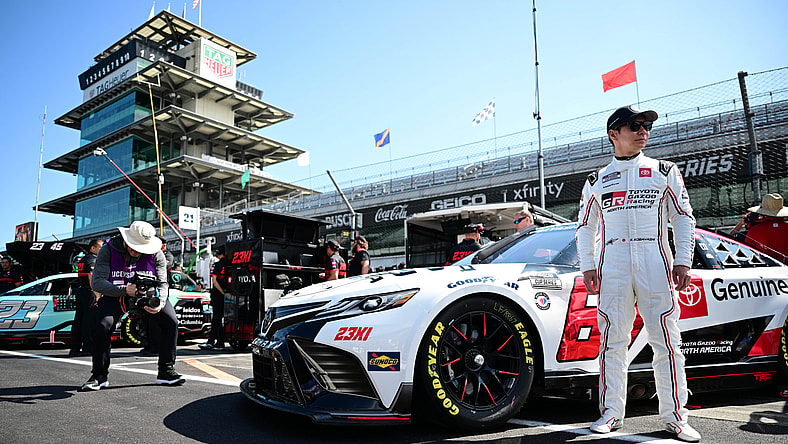
NASCAR has a storied history of hosting events in Japan but it has started to lose a degree of availability in the country says international road racing star Kamui Kobayashi, who is set to make his second career start next week for 23XI Racing at Circuit of the Americas.
The Cup Series is just not as available on television these days.
“NASCAR – we don’t have it on broadcast for example,” Kobayashi said. “Last year, for the Indy race it was live. I think the last broadcast was like in 2016. So, I think maybe people were watching NASCAR and seeing how exciting it was.
“People have been following my social media. I think we are again going to have the live broadcast in Japan next weekend in COTA, so I think people will get more knowledge of NASCAR. The racing in NASCAR is very different, so hopefully people get more of an understanding on what NASCAR racing is.”

However, if NASCAR were to attempt a comeback in the country, it would have one advantage over other exported motorsports disciplines.
Sound.
“I think for sure there is an opportunity,” Kobayashi said. “It is very different than any type of motorsport. It’s the sound. NASCAR has amazing sound. It’s amazing compared to any type of car, even Formula 1. It sounds noisy, but it’s one of the greatest sounds.
“When you are watching them race that close to the wall, it’s something that is hard to believe. I’m impressed. When you look at older Sports Cars, it’s hard to define the noise. If you bring it to Japan, I think people will be impressed with the sound. There’s a big opportunity to bring NASCAR to Japan. I think many people are looking forward to watching the Cup car.”
That was certainly the case when NASCAR staged a pair of exhibition races at Twin Ring Motegi in 1996 and 1997 and on the Twin Ring Motegi Oval in 1998. Attending fans said they loved the sound. It was a similar dynamic to the Garage56 entry at the 24 Hours of Le Mans in 2023.
Fans were drawn to the sound of the V8 engines. It’s an important set of data points as NASCAR continues to explore its next generation engine platform, even the one beyond hybridization over the next couple of years, with the sanctioning body becoming more and more keen on alternative fuels like hydrogen combustion.
NASCAR Vice President of Vehicle Design Brandon Thomas tackled the topic in January during a SiriusXM NASCAR Radio segment.
“A lot of our partners are more and more looking at hydrogen-based solutions,” Thomas said. ” Certainly, for us, the sound of the engines when you throw the green flag … if you love this stuff, you think about it, and you get goosebumps when our cars come to life when they throw the green flag. It’s very appealing to keep that.”
Thomas was part of a group of NASCAR employees, alongside chief operating officer Steve O’Donnell, who went to Japan in November to watch a race featuring hydrogen combustion cars.
“I can say that watching a hydrogen combustion car running an endurance race in Japan sounds like an engine,” Thomas said. “So that was certainly appealing from that perspective. It would be cool as well to get back to leading edge of technology at some point too.”
NASCAR is easier to digest
Kobayashi spent four years in Formula 1, has two World Endurance Championship titles, and has won at both Le Mans and Daytona.
He finished 33rd in his Cup debut at the IMS Road Course and will make his next start on a road course. Speaking to the media before NASCAR weekend at Bristol, would he be open to this kind of racing someday too?
“Maybe in the Truck Series first,” he said.
That wasn’t a no from the still 37-year-old.
“My dream was to race NASCAR a long time ago,” he said. “The first race I ever watched was NASCAR, when I was like four years old. It was an oval race, so that’s why I was dreaming to be here.”
Kobayashi says NASCAR is appealing because it’s simple compared to the complexities associated with Formula 1 or sports car racing.
“It’s difficult to understand as a fan, but when you look at NASCAR, it is simpler,” Kobayashi said. “I know there is technology behind this too but I think as a motorsport the fans can understand what is making a difference at the end of the day.
“It makes a huge difference. I think there is more connectivity from the fans to the drivers.”
Matt Weaver is a Motorsports Insider for Sportsnaut. Follow him on Twitter.